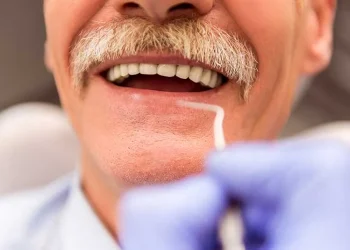Contents
Dental Implant Crowns: What You Need to Know
Dental implants are an excellent option for those who have lost one or more teeth. They are a safe, reliable, and long-term solution that can restore your natural smile and help you regain your confidence. One of the most common procedures performed with dental implants is placing a dental crown on the implant.
What is a Dental Crown on Implant?
A dental crown is a customized tooth-shaped cap that is placed over a dental implant to restore the function and appearance of the missing tooth. The dental crown is usually made of porcelain or ceramic, which matches the color of your natural teeth. The crown is attached to the dental implant at the end of the implant procedure with an abutment, which connects the two pieces together.

Types of Dental Crown
Metal Crowns
Metal crowns are made of alloys that are strong and durable, such as gold, platinum, or base-metal alloys like cobalt-chromium and nickel-chromium. Metal crowns are a good choice for molars, as they can withstand the force of chewing and grinding. However, they are not aesthetically pleasing, as they are visible and do not match the natural color of teeth.
Porcelain and Ceramic Crowns
Porcelain and ceramic crowns are a really popular choice for front teeth. They are also strong and durable, but not as much so as metal crowns. Porcelain and ceramic crowns can be bonded to metal, which gives them additional strength, or they can be made entirely of porcelain or ceramic. The drawback of porcelain and ceramic crowns is that they can chip or break more easily than metal crowns.
Composite Resin Crowns
Composite resin crowns are made of a tooth-colored filling material that is applied to the tooth and shaped to form a crown. They are less expensive than other types of crowns, but they are not as strong or durable. Composite resin crowns are a good choice for temporary crowns or for children who are still growing and developing.
Zirconia Crowns
Zirconia crowns are made of a strong, biocompatible material that is white and tooth-colored. They are a popular choice for back teeth because they are strong and durable. Zirconia crowns are also less likely to crack or chip than porcelain or ceramic crowns. However, one drawback is that their prices are higher than other types of crowns.
The Procedure to Place Dental Crown on Implant
Before the procedure, your dentist will conduct a comprehensive examination of your teeth and gums to ensure that you are a viable candidate for dental implants. During this evaluation, your dentist will also discuss the procedure with you, answering any questions you may have and providing you with any necessary information.
Once you have been determined to be a suitable candidate, the actual dental implant procedure will begin. This involves surgically inserting the implant into your jawbone, which will then fuse with the bone over a period of several months, creating a strong foundation for the dental crown.
While you wait for the implant to fuse with the bone, your dentist will provide you with temporary teeth so that you can still eat and speak normally. Once the implant has successfully fused with the bone, your dentist will place an abutment on top of the implant. This process typically requires a second visit to the dentist.
Your dentist will then take impressions of your teeth to create a customized dental crown that matches the color and shape of your natural teeth. This is an important step, as it ensures that the dental crown will look and feel like a natural part of your mouth. Once the dental crown is ready, your dentist will attach it to the abutment, completing the dental crown on implant procedure.
After the procedure, your dentist will provide you with detailed aftercare instructions to ensure that your implant heals properly and that the dental crown remains firmly in place for many years to come. It is important to follow these instructions carefully in order to achieve the best possible outcome from your dental implant procedure.

Preparations for Dental Crown on Implant
Consultation with Your Dentist
Before the dental crown on implant procedure, you will need to schedule a consultation with your dentist. During this consultation, your dentist will evaluate your oral health and assess whether you are a suitable candidate for dental implants. Your dentist will also discuss the dental crown on implant procedure and answer any questions you may have.
X-rays and Impressions
Your dentist will take X-rays of your teeth and jawbone to determine the best placement for the implant. Your dentist will also take impressions of your teeth to create a customized dental crown that matches the color and shape of your natural teeth. This is an important step to ensure that the dental crown looks and feels like a natural part of your mouth.
Medical History
It is important to inform your dentist of your complete medical history, including any medications you are taking or any medical conditions you have. This will help your dentist determine whether dental implants are a suitable option for you and whether any modifications need to be made to the procedure.
Smoking and Alcohol
Smoking and drinking alcohol can have a negative impact on the success of the dental crown on implant procedure. Smoking can delay the healing process and increase the risk of implant failure, while alcohol can interfere with the healing process. It is best to quit smoking and avoid alcohol for several days before and after the procedure.
Anesthesia
The dental crown on implant procedure is usually performed under local anesthesia, which numbs the area around the implant. However, if you are nervous or anxious about the procedure, your dentist may recommend sedation to help you relax. Your dentist will discuss your options for anesthesia and sedation during your consultation.
Transportation
After the procedure, you may feel groggy or dizzy from the effects of the anesthesia or sedation. This is a normal reaction to the medication and should not be a cause for concern. However, it is recommended that you arrange for transportation to and from the dental office, as driving or operating heavy machinery while under the influence of anesthesia or sedation can be dangerous. Additionally, it is advisable to have a responsible adult accompany you to the appointment, as you may experience some mild confusion or disorientation immediately after the procedure. This person can help you fill out any necessary paperwork, communicate with the dental staff on your behalf, and ensure that you follow all post-operative instructions. Remember, your safety and wellbeing are our top priorities, and we are committed to providing you with the highest quality care possible.
Caring for Your Dental Crown on Implant
After undergoing the dental crown on implant procedure, it is important to take proper care of your new tooth to ensure its longevity and functionality. Here are some tips to help you care for your dental crown on implant.
Brushing and Flossing
Brushing your teeth twice a day and flossing at least once a day is essential to maintain good oral hygiene and prevent gum disease. Use a soft-bristled toothbrush and fluoride toothpaste to gently brush your teeth and gum line, paying extra attention to the area around the implant crown. Flossing helps to remove food particles and plaque from places that your toothbrush can’t reach, which is between your teeth and under the gum line. Use a floss threader or interdental brush to clean around the implant crown, being careful not to pull too hard on the floss.
Using Mouthwash
Rinsing your mouth with an antiseptic mouthwash can help reduce plaque and bacteria in your mouth, preventing gum disease and bad breath. Choose a mouthwash that is alcohol-free and specifically designed for people with dental implants. Avoid using mouthwash containing hydrogen peroxide, as it can damage the implant crown.
Eating Habits
Avoid chewing on hard or sticky foods, as they can damage the implant crown. Opt for softer foods that are easier to chew, such as cooked vegetables, fruits, and lean proteins. Cut your food into smaller pieces and chew slowly and carefully to avoid putting too much pressure on the implant crown.
Regular Dental Check-Ups
Regular dental check-ups are crucial to ensure that your dental crown on implant is functioning correctly and to address any potential issues before they become serious. Your dentist will examine your implant crown and surrounding teeth and gums, clean your teeth, and take X-rays to check the implant’s integrity. Your dentist may also recommend professional cleaning to remove any plaque or tartar buildup around the implant crown.
Dental crown on implant is a safe, reliable, and long-term solution for those who have lost one or more teeth. It is a procedure that can restore the function and appearance of your natural teeth and improve your overall quality of life. If you are considering dental implants, talk to your dentist about the dental crown on implant procedure and see if it is the right option for you.














